See also
- Philip Waller, English historian
Phil Waller may refer to:
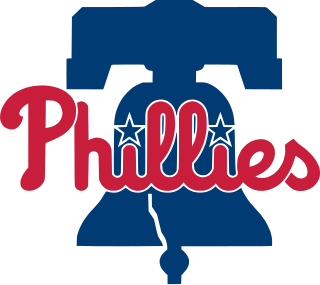
The Philadelphia Phillies are an American professional baseball team based in Philadelphia. They compete in Major League Baseball (MLB) as a member of the National League (NL) East division. Since 2004, the team's home stadium has been Citizens Bank Park, located in South Philadelphia. The Phillies are the oldest continuous same-name, same-city franchise in American professional sports.
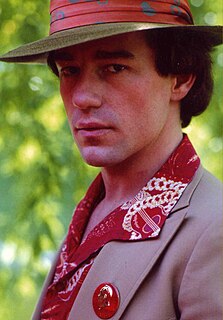
Philip Edward Hartman was a Canadian-American actor, comedian, screenwriter, and graphic designer. Hartman was born in Brantford, Ontario, Canada, and his family moved to the United States when he was ten years old. After graduating from California State University, Northridge with a degree in graphic arts, he designed album covers for bands including Poco and America. In 1975, Hartman joined the comedy group The Groundlings, where he helped Paul Reubens develop his character Pee-wee Herman. Hartman co-wrote the film Pee-wee's Big Adventure and made recurring appearances as Captain Carl on Reubens' show Pee-wee's Playhouse.

Philip David Charles Collins is an English drummer, singer-songwriter, record producer, and actor. He is best known for his tenure as the drummer and lead singer of the rock band Genesis and for his solo career which began in 1981. Between 1982 and 1990, Collins scored three UK and seven US number-one singles as a solo artist. When his work with Genesis, his work with other artists, as well as his solo career is totalled, he had more US top 40 singles than any other artist during the 1980s. His most successful singles from the period include "In the Air Tonight", "Against All Odds ", "One More Night", and "Another Day in Paradise".

Harry Leroy "Roy" Halladay III was an American professional baseball pitcher, who played in Major League Baseball (MLB) for the Toronto Blue Jays and Philadelphia Phillies between 1998 and 2013. His nickname, "Doc", was coined by Toronto Blue Jays announcer Tom Cheek, and was a reference to Wild West gunslinger Doc Holliday. An eight-time All-Star, Halladay was one of the most dominant pitchers of his era. Known for his outstanding durability, he led the league in complete games seven times, the most of any pitcher whose career began after 1945. He also led the league in strikeout-to-walk ratio five times and innings pitched four times.

The Wall of Sound is a music production formula developed by American record producer Phil Spector at Gold Star Studios, in the 1960s, with assistance from engineer Larry Levine and the conglomerate of session musicians later known as "the Wrecking Crew". The intention was to exploit the possibilities of studio recording to create an unusually dense orchestral aesthetic that came across well through radios and jukeboxes of the era. Spector explained in 1964: "I was looking for a sound, a sound so strong that if the material was not the greatest, the sound would carry the record. It was a case of augmenting, augmenting. It all fit together like a jigsaw."

National League Park during most of its history, and commonly referred to as Baker Bowl since 1923, was a baseball stadium and home to the Philadelphia Phillies from 1887 until 1938, and first home field of the Philadelphia Eagles from 1933 to 1935. The ballpark was located in North Philadelphia on a city block bounded by N Broad St, W Huntingdon St, N 15th St, and W Lehigh Ave.
The Zone is the flagship weekday afternoon programming block on the Canadian television channel YTV. It currently airs between 4:00 p.m. and 6:00 p.m. ET and PT in Canada. On Saturday mornings, it is called The Zone Weekend.
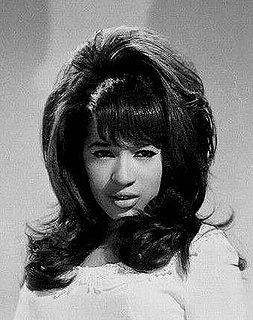
Veronica Yvette Greenfield, known professionally as Veronica and her former married name Ronnie Spector, was an American singer who co-founded and fronted the girl group the Ronettes. She is sometimes referred to as the original "bad girl of rock and roll".
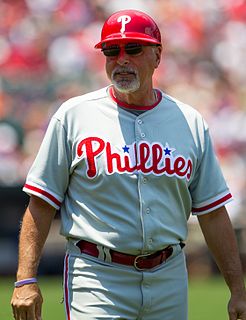
Samuel Benedict Perlozzo is a former second baseman and manager in Major League Baseball, most recently with the Baltimore Orioles.

"You've Lost That Lovin' Feelin'" is a song by Phil Spector, Barry Mann and Cynthia Weil, first recorded in 1964 by the American vocal duo the Righteous Brothers, whose version was also produced by Spector and is cited by some music critics as the ultimate expression and illustration of his Wall of Sound recording technique. The record was a critical and commercial success on its release, reaching number one in early February 1965 in both the United States and the United Kingdom. The single ranked No. 5 in Billboard's year-end Top 100 of 1965 Hot 100 hits – based on combined airplay and sales, and not including three charted weeks in December 1964 – and has entered the UK Top Ten on an unprecedented three occasions.

"Thru' These Walls" is a song by the English drummer Phil Collins. It was released as a single in October 1982, being Collins' fourth single. The song is also the seventh track and first single release from Collins' second solo studio album, Hello, I Must Be Going!, released in November of the same year. The song is dark, which follows a vast majority of songs from the album, and is about a man listening through the wall to his neighbours partaking in sexual activities.
The Wall of Sound is a music production formula created by Phil Spector in the 1960s.

The Philadelphia Baseball Wall of Fame is a collection of plaques, mounted on a brick wall next to the Left Field Gate at Citizens Bank Park, the ballpark of the Philadelphia Phillies. From 1978 to 2003, the Phillies inducted one figure from their franchise history and one notable person from the Philadelphia Athletics (A's) organization each year—with the exception of 1983, when the Phillies inducted their Centennial Team. Once Veterans Stadium closed in 2003, the wall plaques used to recognize the Phillies' members were moved to Citizens Bank Park; however, the Phillies no longer induct notable Athletics. Each person inducted into the Wall of Fame was honored with a metal plaque showing the person's face; their position with, and years of service to the team; and a summary of their most important contributions. In March 2004, the Athletics' plaques were relocated to the Philadelphia Athletics Historical Society in Hatboro, Pennsylvania, and a single plaque listing all of the A's inductees was attached to a statue of Connie Mack located across the street from Citizens Bank Park.
Phil Taylor may refer to:
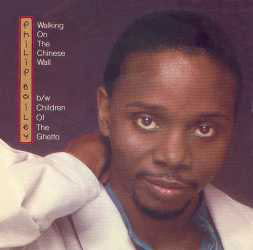
"Walking on the Chinese Wall" is a song by American singer Philip Bailey released as the title track and third single from his 1984 studio album Chinese Wall produced by Phil Collins. The song features Collins on drums and background vocals and was later released by Collins on his 2018 Plays Well With Others box set. Written by Roxanne Seeman and Billie Hughes, it is an ode to the mystical and mercurial nature of life and love, inspired by Dream of the Red Chamber, Chinese philosophy and the I Ching.

Harvey Phillip Spector was an American record producer and songwriter, best known for his innovative recording practices and entrepreneurship in the 1960s, followed decades later by his two trials and conviction for murder in the 2000s. Spector developed the Wall of Sound, a production style that is characterized for its diffusion of tone colors and dense orchestral sound, which he described as a Wagnerian approach to rock and roll. He is regarded as one of the most influential figures in pop music history and one of the most successful producers of the 1960s.
VeggieTales is an American Christian computer generated musical children's animation and Christian media franchise created by Phil Vischer and Mike Nawrocki under Big Idea Entertainment. The series sees fruit and vegetable characters retelling Christian stories from the Bible, with episodes presenting life lessons according to a biblical worldview.

Philip Dunton Murphy is an American financier, diplomat, and politician who has served as the 56th governor of New Jersey since January 2018. He succeeded Republican Chris Christie in the governorship. A member of the Democratic Party, he served as the United States ambassador to Germany from 2009 to 2013 under President Barack Obama.
Rally Squirrel is the name given to an American gray squirrel which appeared on the field and ran across home plate at Busch Stadium during a 2011 National League Division Series (NLDS) Major League Baseball game between the Philadelphia Phillies and St. Louis Cardinals on October 5, 2011. The squirrel captured American media attention, and was adopted as an unofficial mascot by the Cardinals and the populace of St. Louis. The Cardinals would go on to win the 2011 World Series in dramatic fashion.